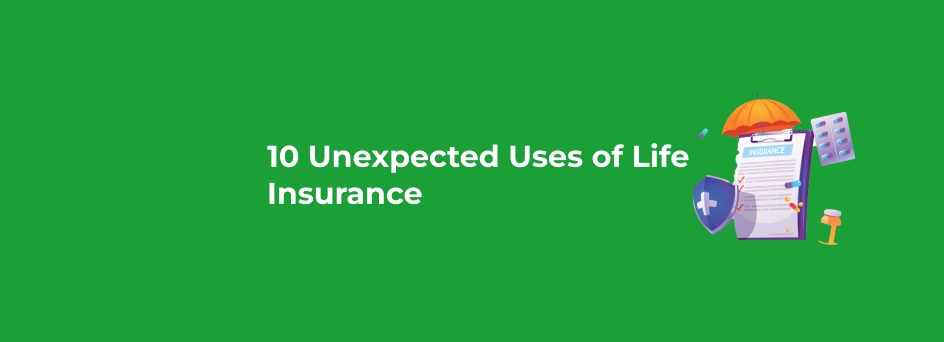10 Unexpected Uses of Life Insurance
September is Life Insurance Awareness Month (LIAM). Life insurance has long been associated with providing financial security for your loved ones after your passing. While this is undoubtedly one of its core functions, there are numerous unconventional and often overlooked uses of life insurance.
In this article, we will explore ten unexpected reasons to consider life insurance, shedding light on the diverse benefits it can offer beyond the conventional view.
1. Business Uses of Life Insurance
If you are a business owner, life insurance can be essential for safeguarding your enterprise and financial interests in several ways.
Life insurance can cover business loans and debts, ensuring that your business doesn’t become a financial burden for your family or partners.
Key person insurance is an essential safeguard for businesses. It protects against the financial impact of losing a vital employee or executive, covering recruiting and training costs for a replacement.
The unexpected death of a business partner can lead to turmoil. Life insurance can prevent such disruptions, ensuring the business continues to operate smoothly. Businesses often rely on life insurance to fund buy-sell agreements, allowing your business partners to buy out your shares and ensure a smooth transition in the event of your death. This effectively safeguards your family’s financial interests in the business, preventing disputes and ensuring a fair transition of ownership.
2. Life Insurance for Retirement
Life insurance offers tax advantages, including tax-deferred growth of cash value and tax-free withdrawals when structured correctly. This cash value can serve as an additional source of income during your retirement years, enhancing your financial security. Life insurance acts as a safety net, preserving your retirement savings by providing a buffer against unexpected expenses and market downturns, helping you maintain your quality of life.
3. Role of Life Insurance in Estate Planning
Estate taxes can diminish the assets you intend to leave to your heirs. Life insurance helps mitigate estate taxes, ensuring that more of your assets pass directly to your intended beneficiaries.
Life insurance can be a powerful tool for equalizing inheritances, ensuring that each heir receives their intended share. By designating certain heirs as beneficiaries of life insurance, you can balance inheritances and reduce the potential for disputes and conflicts among heirs, promoting harmony in the distribution of assets.
4. Life Insurance for College Education
Life insurance can be a strategic tool for planning and funding your child’s education, ensuring they have access to quality schooling, even if you’re not there to provide for it.
Tax-free withdrawals from life insurance cash values can cover educational expenses, making it a valuable resource for securing your child’s future. With life insurance, you can guarantee that your child’s education remains financially secure, regardless of unforeseen circumstances.
Furthermore, life insurance is not counted towards income and assets when applying for financial aid. This will allow you to get more aid available to you.
5. Special Needs and Life Insurance
Life insurance provides essential financial security for family members with special needs, ensuring they receive the care and support they require. By funding special needs trusts with life insurance, you protect your loved one’s eligibility for government benefits while providing for their unique needs.
Life insurance offers peace of mind, knowing that your special needs dependent will have a long-term financial safety net, regardless of your presence.
6. Life Insurance to Cover Mortgage Debt
Life insurance can be utilized to pay off your mortgage in the event of your passing, ensuring your family can remain in their home without the added stress of mortgage debt.
It provides peace of mind, knowing that your family won’t face the risk of losing their home due to mortgage debt after you’re gone.
Life insurance offers homeowners peace of mind, knowing that their most significant asset—their home—is protected and secure, regardless of life’s uncertainties.
7. Divorce: The Role of Life Insurance
Life insurance ensures a smooth financial transition for your family following a divorce, minimizing disruptions and providing financial security. It can be a valuable tool for fulfilling financial obligations such as alimony and child support, ensuring the well-being of your former spouse and children.
8. Life Insurance for Charity, Impactful Philanthropy
Life insurance enables impactful philanthropy by allowing you to designate charitable organizations as beneficiaries, leaving a legacy of giving. It empowers you to leave a lasting legacy in your community, supporting causes and initiatives that matter deeply to you.
By using life insurance strategically, you can fulfill your philanthropic goals and make a significant positive impact on the world, even after you’re gone. You can designate a charitable organization as a beneficiary, allowing you to make a significant impact on a cause you’re passionate about even after your passing.
If you’re deeply committed to a particular charity or cause, life insurance can be a powerful way to leave a lasting impact.
9. Supporting Aging Parents and End of Life Expenses
As life expectancy increases, more individuals find themselves responsible for caring for aging parents. Aging parents may require financial assistance to cover medical expenses, caregiving, and other costs associated with growing older.
Life insurance can provide the necessary financial support to ensure that your parents can age comfortably and with dignity. It can cover the costs associated with caregiving for a loved one who becomes incapacitated due to illness or injury.
End-of-life care can be emotionally and financially challenging. Life insurance can help alleviate the financial burden by covering the often substantial medical bills and hospice care costs associated with this phase of life. It can ensure a dignified and comfortable end-of-life experience, free from the financial worries that can often accompany it.
Life insurance can cover the high costs associated with end-of-life medical care, ensuring you receive the care and comfort you deserve. By having life insurance in place, you relieve your loved ones of the financial burden associated with your end-of-life care, allowing them to focus on providing emotional support.
10. Ensuring Insurability
Securing life insurance while you’re young and healthy allows you to lock in lower premiums, potentially saving a substantial amount of money over the life of the policy.
As you age, your health may change, potentially making it more challenging and expensive to secure coverage. Life insurance ensures you have coverage in place, shielding you against unforeseen health issues. Life insurance provides flexibility and options as you age, allowing you to adjust your coverage to meet changing needs and circumstances, ensuring a secure financial future for yourself and your loved ones.
Conclusion
In conclusion, life insurance offers more than just a financial safety net for your family. It can provide peace of mind, support your business interests, leave a legacy, pay off debt and mortgage, care for special needs children, and help cope with divorce and end-of-life needs.
It’s crucial to consult with a financial advisor to explore the diverse options available and tailor a life insurance plan to your unique needs and goals. By doing so, you can unlock the full potential of life insurance and secure a brighter future for yourself and your loved ones.
Book a meeting to see how life insurance can be tailored to your specific situation and needs.
Sheilla Vidal is a Retirement Income Certified Professional RICP® and life insurance broker. She is also a physical therapist, a mom of two and one of the caregivers for her 85-year-old dad. She is an avid learner. She writes, speaks, and recognizes that her work in helping clients live with dignity is her God-given mission.



